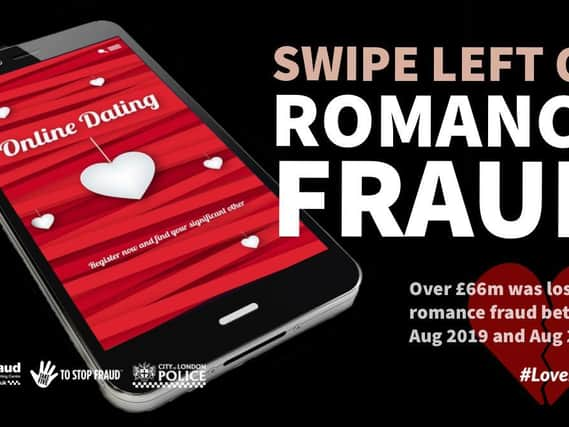Thames Valley Police warn Aylesbury residents about the dangers of 'romance fraud'


The top five platforms where victims reported first interacting with the criminal committing romance fraud were Facebook, Plenty of Fish, Instagram, Tinder and Match.com.
As part of the campaign the Match Group, who own OK Cupid, Plenty of Fish, Tinder and Match.com, are running romance fraud protection adverts throughout October on these platforms, to inform their users how to spot the signs of a romance fraud and how to protect themselves online.
Advertisement
Hide AdAdvertisement
Hide AdOver £3 million was lost in the past year in the Thames Valley to criminals who commit romance fraud.
If you’re speaking to someone online that you’ve not met in person, stop and think. It could protect you and your money.
Temporary Detective Chief Superintendent Alex Rothwell, from the City of London Police, said:
“Romance fraud is a devastating crime that impacts victims both financially and emotionally. It is a crime that we in policing across the UK, are committed to tackling with help from key partners. Through this campaign we want to empower people to understand what to look out for and feel confident that if they have fallen victim to a fraud, to report it to us.
Advertisement
Hide AdAdvertisement
Hide Ad“Criminals are experts at impersonating people. They spend hours researching you for their scams, especially when committing romance fraud. We’re reminding everyone to stop and think: fall for the person, not the profile, it could protect you and your money.”
Romance fraud, or dating fraud, occurs when you think you’ve met the perfect partner online but they are using a fake profile to form a relationship with you. They gain your trust over a number of weeks or months and have you believe you are in a loving and caring relationship. However, the criminal’s end goal is only ever to get your money or personal information.
Between August 2019 and August 2020, Action Fraud received over 400 reports a month from victims of romance fraud in the UK. Losses reported by victims during this time totalled £66,335,239, equating to an average loss per victim of just over £10,000.
During June, July and August 2020, Action Fraud received more than 600 reports per month of romance fraud, indicating people may have met, and begun talking to, romance fraudsters during the national lockdown caused by the coronavirus outbreak.
Advertisement
Hide AdAdvertisement
Hide AdDiana Fawcett, Chief Executive of the independent charity Victim Support, said:
“Victims of romance fraud often blame themselves, but it is important to understand that this is an incredibly sophisticated crime, and that almost anyone can be targeted. Victims may feel they have not only lost money, but also a loving partner or relationship they thought they had.
“Lockdown restrictions meant people could not meet in person for a number of months, which led to many seeking to form new connections online. Whilst using the internet can be a great way to meet people and form relationships, there’s also a great risk of being lured into a romance scam as fraudsters know how to take advantage of people’s desire for human contact. Unfortunately, we’ve seen that circumstances caused by coronavirus were in fact used by fraudsters as a ‘hook’ to extort money. For example, some have invented lies about needing medical treatment, or urgent travel expenses to leave a country, or funds to keep afloat after a bogus job loss caused by the pandemic.
“It’s important to be aware that not everyone is who they say they are.”